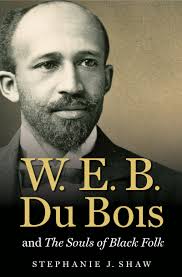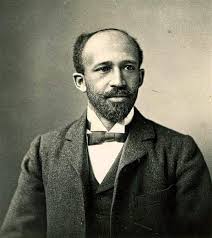The Souls of Black Folk Page #29
The Souls of Black Folk is a 1903 work of American literature by W. E. B. Du Bois. It is a seminal work in the history of sociology and a cornerstone of African-American literature. The book contains several essays on race, some of which the magazine Atlantic Monthly had previously published.
Now Sears, whom we met next lolling under the chubby oak-trees, was of quite different fibre. Happy?—Well, yes; he laughed and flipped pebbles, and thought the world was as it was. He had worked here twelve years and has nothing but a mortgaged mule. Children? Yes, seven; but they hadn’t been to school this year,—couldn’t afford books and clothes, and couldn’t spare their work. There go part of them to the fields now,—three big boys astride mules, and a strapping girl with bare brown legs. Careless ignorance and laziness here, fierce hate and vindictiveness there;—these are the extremes of the Negro problem which we met that day, and we scarce knew which we preferred. Here and there we meet distinct characters quite out of the ordinary. One came out of a piece of newly cleared ground, making a wide detour to avoid the snakes. He was an old, hollow-cheeked man, with a drawn and characterful brown face. He had a sort of self-contained quaintness and rough humor impossible to describe; a certain cynical earnestness that puzzled one. “The niggers were jealous of me over on the other place,” he said, “and so me and the old woman begged this piece of woods, and I cleared it up myself. Made nothing for two years, but I reckon I’ve got a crop now.” The cotton looked tall and rich, and we praised it. He curtsied low, and then bowed almost to the ground, with an imperturbable gravity that seemed almost suspicious. Then he continued, “My mule died last week,”—a calamity in this land equal to a devastating fire in town,—‘but a white man loaned me another.” Then he added, eyeing us, “Oh, I gets along with white folks.” We turned the conversation. “Bears? deer?” he answered, “well, I should say there were,” and he let fly a string of brave oaths, as he told hunting-tales of the swamp. We left him standing still in the middle of the road looking after us, and yet apparently not noticing us. The Whistle place, which includes his bit of land, was bought soon after the war by an English syndicate, the “Dixie Cotton and Corn Company.” A marvellous deal of style their factor put on, with his servants and coach-and-six; so much so that the concern soon landed in inextricable bankruptcy. Nobody lives in the old house now, but a man comes each winter out of the North and collects his high rents. I know not which are the more touching,—such old empty houses, or the homes of the masters’ sons. Sad and bitter tales lie hidden back of those white doors,—tales of poverty, of struggle, of disappointment. A revolution such as that of ’63 is a terrible thing; they that rose rich in the morning often slept in paupers’ beds. Beggars and vulgar speculators rose to rule over them, and their children went astray. See yonder sad-colored house, with its cabins and fences and glad crops! It is not glad within; last month the prodigal son of the struggling father wrote home from the city for money. Money! Where was it to come from? And so the son rose in the night and killed his baby, and killed his wife, and shot himself dead. And the world passed on. I remember wheeling around a bend in the road beside a graceful bit of forest and a singing brook. A long low house faced us, with porch and flying pillars, great oaken door, and a broad lawn shining in the evening sun. But the window-panes were gone, the pillars were worm-eaten, and the moss-grown roof was falling in. Half curiously I peered through the unhinged door, and saw where, on the wall across the hall, was written in once gay letters a faded “Welcome.” Quite a contrast to the southwestern part of Dougherty County is the northwest. Soberly timbered in oak and pine, it has none of that half-tropical luxuriance of the southwest. Then, too, there are fewer signs of a romantic past, and more of systematic modern land-grabbing and money-getting. White people are more in evidence here, and farmer and hired labor replace to some extent the absentee landlord and rack-rented tenant. The crops have neither the luxuriance of the richer land nor the signs of neglect so often seen, and there were fences and meadows here and there. Most of this land was poor, and beneath the notice of the slave-baron, before the war. Since then his poor relations and foreign immigrants have seized it. The returns of the farmer are too small to allow much for wages, and yet he will not sell off small farms. There is the Negro Sanford; he has worked fourteen years as overseer on the Ladson place, and “paid out enough for fertilizers to have bought a farm,” but the owner will not sell off a few acres. Two children—a boy and a girl—are hoeing sturdily in the fields on the farm where Corliss works. He is smooth-faced and brown, and is fencing up his pigs. He used to run a successful cotton-gin, but the Cotton Seed Oil Trust has forced the price of ginning so low that he says it hardly pays him. He points out a stately old house over the way as the home of “Pa Willis.” We eagerly ride over, for “Pa Willis” was the tall and powerful black Moses who led the Negroes for a generation, and led them well. He was a Baptist preacher, and when he died, two thousand black people followed him to the grave; and now they preach his funeral sermon each year. His widow lives here,—a weazened, sharp-featured little woman, who curtsied quaintly as we greeted her. Further on lives Jack Delson, the most prosperous Negro farmer in the county. It is a joy to meet him,—a great broad-shouldered, handsome black man, intelligent and jovial. Six hundred and fifty acres he owns, and has eleven black tenants. A neat and tidy home nestled in a flower-garden, and a little store stands beside it. We pass the Munson place, where a plucky white widow is renting and struggling; and the eleven hundred acres of the Sennet plantation, with its Negro overseer. Then the character of the farms begins to change. Nearly all the lands belong to Russian Jews; the overseers are white, and the cabins are bare board-houses scattered here and there. The rents are high, and day-laborers and “contract” hands abound. It is a keen, hard struggle for living here, and few have time to talk. Tired with the long ride, we gladly drive into Gillonsville. It is a silent cluster of farmhouses standing on the crossroads, with one of its stores closed and the other kept by a Negro preacher. They tell great tales of busy times at Gillonsville before all the railroads came to Albany; now it is chiefly a memory. Riding down the street, we stop at the preacher’s and seat ourselves before the door. It was one of those scenes one cannot soon forget:—a wide, low, little house, whose motherly roof reached over and sheltered a snug little porch. There we sat, after the long hot drive, drinking cool water,—the talkative little storekeeper who is my daily companion; the silent old black woman patching pantaloons and saying never a word; the ragged picture of helpless misfortune who called in just to see the preacher; and finally the neat matronly preacher’s wife, plump, yellow, and intelligent. “Own land?” said the wife; “well, only this house.” Then she added quietly. “We did buy seven hundred acres across up yonder, and paid for it; but they cheated us out of it. Sells was the owner.” “Sells!” echoed the ragged misfortune, who was leaning against the balustrade and listening, “he’s a regular cheat. I worked for him thirty-seven days this spring, and he paid me in cardboard checks which were to be cashed at the end of the month. But he never cashed them,—kept putting me off. Then the sheriff came and took my mule and corn and furniture—” “Furniture? But furniture is exempt from seizure by law.” “Well, he took it just the same,” said the hard-faced man.
Translation
Translate and read this book in other languages:
Select another language:
- - Select -
- 简体中文 (Chinese - Simplified)
- 繁體中文 (Chinese - Traditional)
- Español (Spanish)
- Esperanto (Esperanto)
- 日本語 (Japanese)
- Português (Portuguese)
- Deutsch (German)
- العربية (Arabic)
- Français (French)
- Русский (Russian)
- ಕನ್ನಡ (Kannada)
- 한국어 (Korean)
- עברית (Hebrew)
- Gaeilge (Irish)
- Українська (Ukrainian)
- اردو (Urdu)
- Magyar (Hungarian)
- मानक हिन्दी (Hindi)
- Indonesia (Indonesian)
- Italiano (Italian)
- தமிழ் (Tamil)
- Türkçe (Turkish)
- తెలుగు (Telugu)
- ภาษาไทย (Thai)
- Tiếng Việt (Vietnamese)
- Čeština (Czech)
- Polski (Polish)
- Bahasa Indonesia (Indonesian)
- Românește (Romanian)
- Nederlands (Dutch)
- Ελληνικά (Greek)
- Latinum (Latin)
- Svenska (Swedish)
- Dansk (Danish)
- Suomi (Finnish)
- فارسی (Persian)
- ייִדיש (Yiddish)
- հայերեն (Armenian)
- Norsk (Norwegian)
- English (English)
Citation
Use the citation below to add this book to your bibliography:
Style:MLAChicagoAPA
"The Souls of Black Folk Books." Literature.com. STANDS4 LLC, 2025. Web. 10 Jan. 2025. <https://www.literature.com/book/the_souls_of_black_folk_310>.




Discuss this The Souls of Black Folk book with the community:
Report Comment
We're doing our best to make sure our content is useful, accurate and safe.
If by any chance you spot an inappropriate comment while navigating through our website please use this form to let us know, and we'll take care of it shortly.
Attachment
You need to be logged in to favorite.
Log In